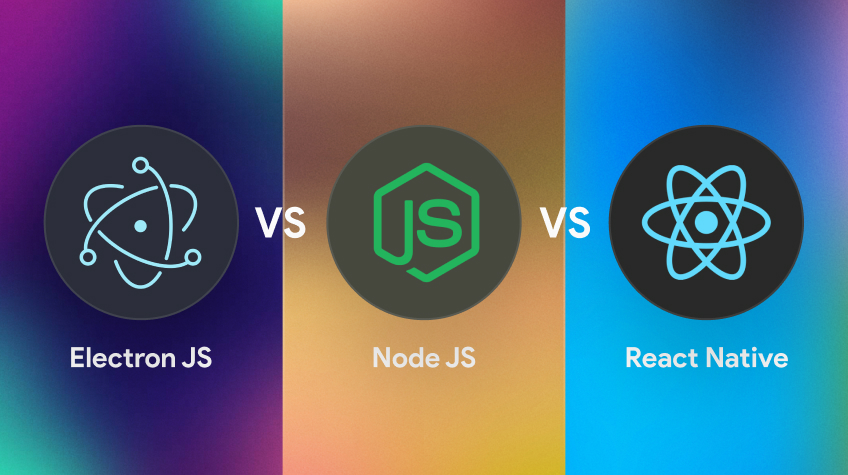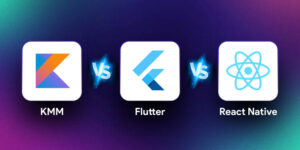
Are you ready to explore Electron JS vs React Native vs Node JS? If yes, then keep scrolling this article. Whether you are a developer or a tech enthusiast, this article is going to help you tremendously.
In this post, we are going to learn about the major differences between popular frameworks: Electron JS, React Native, and Node JS. These frameworks help to build web or mobile applications.
Table of Contents
- What Are Frameworks And Why Are They Needed?
- Electron JS
- React Native
- Node JS
- Pros & Cons Of Electron JS
- Pros & Cons Of React Native
- Pros & Cons Of Node JS
- Comparing Electron JS vs React Native vs Node JS
- Brands Using Electron JS, React Native, and Node JS
- Which One Is Better?
What Are Frameworks And Why Are They Needed?
A framework is a collection of tools and libraries. This collection of tools and libraries helps developers develop software more quickly and easily. A framework provides developers with the structure for their codes and pre-built functions and libraries that they can use. Frameworks are designed to save developers’ time and effort. There are numerous frameworks. However, the best ones include Electron JS, React Native, and Node JS. Both mobile and web applications play a pivotal role in people’s daily lives. Developers utilize these frameworks to develop their apps from scratch. In that instance, frameworks are crucial to crafting any high-performance application.
This article introduces and compares the most important frameworks and a runtime environment such as Electron JS, React Native, and Node JS. It helps the developers pick the right framework for their projects.
Without further ado, let’s begin!
❖ Electron JS
Electron JS is a free and open-source framework developed by the OpenJS Foundation. It is formerly called Atom Shell and is exclusively designed for creating desktop applications using web technologies. It includes HTML, CSS, JavaScript, etc. Electron uses various APIs to enable native integration with Node.js services. And also, Electron JS is a blend of two popular technologies, Chromium and Node.JS.
Plenty of reasons are available for using Electron JS to create desktop applications. Electron JS takes care of all these steps, such as the simplification of packaging, updating, installation, and providing support for native menus, notifications, and the end optimization of app crash reports.
❖ React Native
Everyone knows that a framework is a platform for developing various mobile or web applications. React Native is an open-source framework packed with abundant resources. This efficient framework includes pre-built libraries, components, and reference materials. Developers can easily get the basic structure of the applications and customize them according to the project demands using React Native.
Do you know the reason behind Native in the framework? Some smartphones own their native applications. Software developed using React Native is specifically designed for use on a particular platform or device. For instance, Samsung includes a few applications to serve its potential users. React Native enables you to render apps natively, which enhances the overall user experience and performance.
Also Check: Best React Native Alternative Framework for Mobile App Development
❖ Node JS
Both Electron JS and React Native are frameworks, but Node JS differs from these two. It is an open-source, cross-platform JavaScript runtime environment that runs on diverse OS. Such as Windows, Linux, MacOS, UNIX, and more. It runs on the V8 JavaScript engine that makes it perfect to build back-end applications.
So, Node JS can seamlessly work on various platforms and is publicly available. Using JavaScript, developers can create web servers, networking tools, and a collection of modules for handling core functionalities. Now, let’s know about the advantages and disadvantages of Electron JS, React Native, and Node JS.
Pros & Cons Of Electron JS
Here is a list of the advantages and disadvantages of Electron JS. Comparing such things with other frameworks helps you choose the best one for your project.
❖ Advantages
- Offers a compelling framework for creating cross-platform apps
- Supportive community
- Code reusability
- Cross-platform compatibility
❖ Disadvantages
- Memory consumption
- Performance concerns
- Application size might be a drawback
Pros & Cons Of React Native
❖ Benefits
- Cost efficiency and resource optimization
- Strategic flexibility and prototyping
- Faster development
- Complete native UI and Native-like performance
- Hot reloading
- Updates easily without app store approval
- Code reusability
- Compatible with third-party plugins
- Pre-developed components
❖ Drawbacks
- Debugging and troubleshooting might be tough
- Chances for updating issues
- Not efficient for complex interfaces
Pros & Cons Of Node JS
❖ Pros
- Reliable, high-performing, and flexible platform
- Scalable applications and faster development
- Error handling
- Enhanced productivity
- Robust technology stack
- Rich ecosystems such as libraries and tools
- Larger developer community and gentle learning curve
❖ Cons
- Performance reduces when computing heavy tasks
- Lack of library support system
- API instability
- Dealing with relational databases
Comparing Electron JS vs React Native vs Node JS
It’s time to dive into the deep comparison: Electron.JS vs.React Native vs. Node.JS. Yeah! It helps you choose the best one of the three. Let’s begin!
❖ Significant Features
Features are the most important thing to discuss, so let’s start from exploring the significant features of Electron JS, React Native, and Node JS.
➪ Electron JS
- Low-Level Accessibility: Electron JS gives access to basic-level hardware and OS components. Plus, it also gives you the power to include interactive features.
- Reusability: Developers work with a single code base, so they can use it for both web and desktop apps. Electron JS supports code distribution everywhere.
- Management Of Code And Apps: Electron JS reduces the time for inspecting the products. If a developer finds a bug on one platform, they can repair it on source code and fix it easily.
➪ React Native
- Cross-Platform Brilliance: With a single code base, developers can easily build apps on multiple platforms. Whether it is Android or iOS, React Native allows writing code once and deploying on various platforms.
- Reusable Components: Similar to Electron JS, React Native also supports the use of reusable UI components.
- Hot Reloading Magic: One of the top most features in React Native is Hot loading. It allows the developers to witness the latest code results instantly without rebuilding the app. This magical feature enhances the debugging and development processes.
➪ Node JS
- Single Threaded: Node JS works on a single thread that is a Single Threaded Event Loop Model architecture. It handles multiple client requests at a time.
- Highly Scalable: Node.js apps operate asynchronously. It means this runtime environment is ready to process every single request that arrives.
- Caching: The most important advantage of Node.js is caching. Developers do not need to re-execute the code; it will be cached in memory.
❖ Use Cases
This section presents the available use cases of Electron JS, React Native, and Node JS. Let’s know about them in detail!
➪ Electron JS
Cross-platform compatibility and the combination of Chromium and Node JS make Electron JS perfect for different applications. It runs on three platforms across all the supported architectures and enhances the desktop development process.
Electron JS is used for building content management systems, social messaging applications, communication tools, and more. Some of the popular platforms built using the Electron framework, include 1Password, Slack, WhatsApp, Skype, and Bitwarden. Let’s now move towards the next section and compare the React Native vs Electron JS use cases.
➪ React Native
React Native lets developers build mobile applications that run on various platforms. The highlighted advantage of React Native is its single codebase, which reduces development time. Several companies choose React Native as it promotes the use of reusable UI components.
Social media messaging applications, e-commerce apps, educational applications, and more use React Native. Some of the well-known companies that embrace the power of React Native are Meta, Shopify, Amazon, Microsoft, Wix, etc.
➪ Node JS
Node.js enhances the team’s productivity as you can use the same programming language on both the front and back ends. It results in much quicker, more efficient, and cross-functional development process.
The use cases of Node JS are streaming web applications, developing real-time chatbots, single-page applications, enabling server-side proxy, and crafting microservice architecture.
Node JS is also used in many industries, such as e-commerce, travel, project management, education, media, health care, and fintech. Some of the popular platforms built on NodeJS include Uber, eBay, Netflix, GoDaddy, LinkedIn, PayPal, and so on.
Let’s now see which platform is better. Here we go…
Brands Using Electron JS, React Native, and Node JS
Frameworks play an important role in building applications. Many popular brands and companies use Electron JS, React Native, and Node JS for developing their applications. This section highlights the brands that are already built on these three popular frameworks. Take a closer look. Even the widely used social media platform can be developed using Electron JS, React Native, and Node JS!
❖ Electron JS
Electron JS has an extensive active community and utilizes the Chromium engine for displaying web content. This framework enhances the overall performance of the applications. Here are the top 10 famous Electron JS application examples, such as:
- WordPress
- Slack
- Visual Studio Code
- Skype
- Atom
- Mailspring
- Pexels
- Simplenote
- Discord
❖ React Native
React Native is a JavaScript-based framework associated with React JS. Many famous brands use React Native because of its enhanced benefits. It includes faster development, cost efficiency, high performance, and easy learning. One of the top advantages of React Native is its nativeness. As mentioned above, React Native strengthens social and service applications.
- Airbnb
- Uber Eats
- Walmart
- Meta
- Microsoft
- Tesla
- Salesforce
- Shopify
- Bloomberg
- Wix
❖ Node JS
Node JS solves various production challenges for renowned organizations. It offers better developer productivity and higher app performance. This section includes the top companies that use Node JS, take a closer look.
- Netlix
- Trello
- PayPal
- NASA
- Yahoo
- eBay
- GoDaddy
- Groupon
- Medium
- Yandex
- Citibank
- Mozilla
Which One Is Better?
Packed with a diverse range of features, Node JS, React Native, and Electron JS offer exceptional performance. All of these frameworks allow developers to create highly scalable, data-intensive applications. All in all, all three are great frameworks for developers!
Each framework differs significantly. When choosing the best one among all, consider your knowledge and the project’s demands. Considering your needs before picking the best framework can help you significantly in your endeavors to develop exceptional applications for your clients.
Also Read: Flutter vs React Native: Guide to Best Framework Choice
Ending Note
Hopefully this post has been informative for you. It helped you understand the detailed comparison of Electron JS vs. React Native vs. Node JS. Whether you’re a beginner or an experienced developer, going with the current trends is essential to build unique applications both for mobiles and the web. To begin, analyze the overall demands of the project and understand the features of each framework. Having an understanding of these things can help you create high-performance applications effortlessly. In addition, it is crucial to consider your skill sets and experience in a particular framework. So, if you are planning to begin your career as a developer, learn these three frameworks so that you can build the application of your dreams!
FAQs
Q1. What type of desktop applications can be built on Electron JS?
Electron JS is undoubtedly a versatile framework for developing desktop applications, but not for all types. It is not suitable for resource-intensive applications that require extensive access to system resources.
Q2. Which is easier to learn among the three?
Electron JS and React Native are the frameworks, whereas Node JS is a runtime environment. The learning curve is easy for all three. Electron JS is a combination of Chromium and Node JS, so a deep understanding of Node JS makes the Electron JS process easy. React Native is easy to learn, even for beginners. So, if you are a beginner or are planning to start as a developer, you can begin your journey with React Native.
Q3. Which is better: Node JS vs. Electron JS?
Both Node JS and Electron JS are suitable for building cross-platform-compatible applications. When it comes to desktop apps, Electron JS must be the pick. If it is server-side development, then Node JS is the greatest choice. So, consider your project’s requirements prior to choosing the right framework. Doing so will help you create a stunning application.






